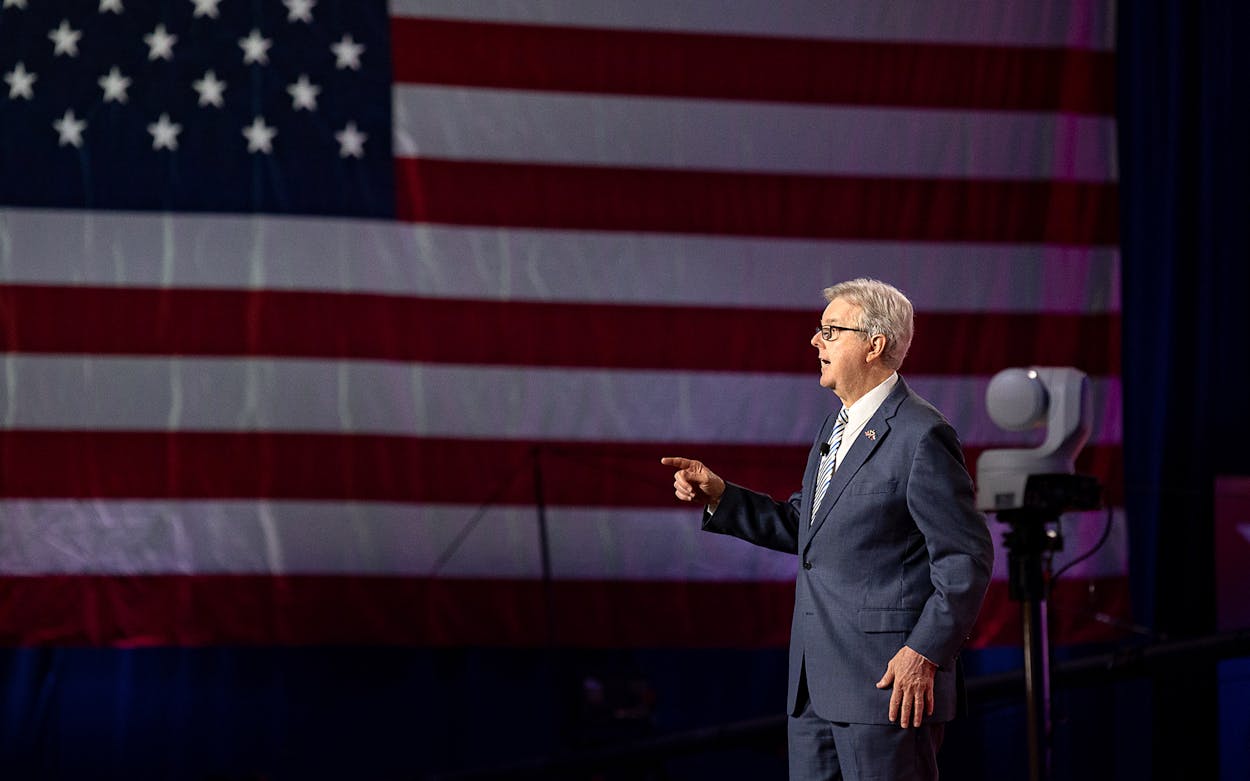Last year, Lieutenant Governor Dan Patrick promised to pass a law requiring state retirement funds to stop doing business with Wall Street firms that, in his word, “boycott” the oil and gas industry. Yet nearly a year after he began his campaign, and months after he shepherded Senate Bill 13 into law, Patrick still owned shares in the firm he called “the worst offender,” BlackRock, the world’s largest money manager. Not just that: he also owned BlackRock mutual funds, along with shares in other companies that have pledged to stop using oil and natural gas.
In recent years, Wall Street has started to embrace socially responsible “ESG” (environment, social, and corporate governance) investing. In general terms, this means considering factors beyond financial performance, such as commitment to sustainability and good working conditions. BlackRock and its chief executive, Larry Fink, are leading voices in the movement. In a letter to shareholders on January 17, Fink argued against the notion that “going woke,” as he wrote, was the driver of the movement. Rather, he suggested, gradually moving investments away from fossil fuels and toward green industries such as wind and solar power is a sound investment strategy for growing resilient businesses that are viable for the long term. “We focus on sustainability not because we’re environmentalists, but because we are capitalists and fiduciaries to our clients,” he wrote, echoing his declaration in 2021 that “climate risk is investment risk.”
Patrick hoped that through SB 13, which charged the comptroller’s office with compiling a list of offending firms, Texas could use the weight of its large retirement funds—the Teacher Retirement System of Texas has nearly $200 billion under management—to turn Wall Street against ESG investing. Two days after Fink’s letter, Patrick sent an open letter to Texas comptroller Glenn Hegar that singled out BlackRock by name. “As you prepare the official list of companies that boycott energy companies, I ask that you include BlackRock,” he wrote, adding that “BlackRock is capriciously discriminating against the oil and gas industry.” He ended his letter with a declaration: “Texas will not do business with those that boycott fossil fuels.”
Patrick, however, had been personally doing business with those firms. At the end of 2021, according to annual financial disclosures Texas Monthly obtained from the Texas Ethics Commission, Patrick owned shares in BlackRock. On top of that, Patrick and his wife owned shares in several BlackRock mutual funds.
After the publication of this article, Patrick’s campaign issued a press release stating that he sold twenty shares in BlackRock, along with his holdings in three BlackRock funds, for $35,021.90 on January 21, 2022. “As soon as the Lt. Governor discovered BlackRock holdings were in his portfolio, he sold them immediately,” said chief campaign strategist Allen Blakemore. This would mean that Patrick sold these holdings seven months after SB 13 was signed into law on June 14, 2021. Two weeks after the bill became law, Patrick filed his annual financial disclosure, which he signed. This filing noted that he owned BlackRock shares.
The lieutenant governor also owned, either directly or with his wife, shares in several other companies that have taken pledges to use only renewable energy in the near future—including Apple, Meta, Microsoft, and Walmart. At the end of 2021, these holdings were worth between $92,000 and $460,000. Texas Monthly asked Patrick’s office and his campaign for details on these holdings but received no response. The Patrick campaign’s press release made no mention of these holdings, or whether they have been sold.
The response from Patrick’s campaign did not acknowledge his holdings in a fourth BlackRock mutual fund. But his financial disclosure showed that Patrick and his wife owned more than 10,000 shares in something called BlackRock FDS V. What is that? It took some digging to find, but it’s a legal entity owned by BlackRock that includes fourteen mutual funds, four of which are on the comptroller’s list of banned funds.
One of the four is BlackRock Sustainable Emerging Markets Bond Fund, which seeks a healthy return while “seeking to maintain certain environmental, governance and social (“ESG”) characteristics, climate risk exposure and climate opportunities relative to the Fund’s benchmark.” Were some of Patrick’s shares invested in that fund? We don’t know, because Patrick didn’t fulfill the official requirement to “enter the name of the mutual fund” on his disclosure statement.
Complying with SB 13—and the similarly structured Senate Bill 19, which targeted investment firms that divested from the gun industry—will have a rising cost for Texans. An analysis of the financial impact of anti-ESG policies from University of Pennsylvania economist Daniel Garrett, published in July, found that the bills will require Texans to pay higher interest rates when our local governments and school systems borrow money. The laws drove five of the largest municipal-bond underwriters out of the state, he notes, leading to reduced competition and higher borrowing costs. Garrett and his coauthor examined $31.7 billion in municipal bonds issued during eight months in 2021 and 2022, concluding that Texans will pay between $300 million and $500 million in higher interest payments. These costs will continue to rise, Garrett told Texas Monthly, as more bonds are issued. If not for the bills scaring away lenders, he said, the state would pay less in interest and have more left over to finance education, roads, or other infrastructure. Texas, he said, “could have made higher-quality school buildings and better sewer systems.”
Patrick apparently felt that forking over an extra $300 million in interest payments was a sacrifice Texans should be willing to make to punish those who shift investments away from the oil and gas industry. But during the year Patrick spent pushing for divestment from BlackRock and similar firms, he seems to have decided that what was best for Texas wasn’t necessarily best for him.
Editors’ note: This article was originally published on the evening of Thursday, September 8. The following morning, Dan Patrick’s campaign issued a press release addressing parts of the article. We have updated the story to reflect new information, including details about some of Patrick’s holdings in BlackRock shares and mutual funds and when he sold them. There were no factual errors in the original story that required correction. In the press release, chief Patrick campaign strategist Allen Blakemore said that after Texas Monthly sent questions to Patrick, our reporters did not respond to emails and calls from Patrick’s campaign. In fact, Texas Monthly sent questions on Wednesday, August 31, asking for a response by Friday, September 2. We heard from a spokesperson for Patrick on Friday evening, extended the deadline to give the Patrick campaign an opportunity to comment, and offered to call after Labor Day weekend. On Tuesday and Wednesday (September 5 and 6), we called twice and sent one text and two emails prior to publication. We did not receive a response.
- More About:
- Politics & Policy
- Dan Patrick










